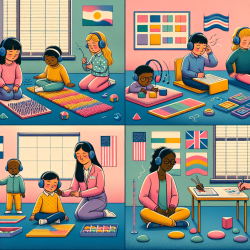Introduction
As practitioners in the field of speech-language pathology, we are acutely aware of the importance of mental health literacy (MHL) in shaping positive outcomes for children and adolescents. The research titled "Psychometric Properties of the Persian Version of Mental Health Literacy Scale" by Heizomi et al. provides a comprehensive analysis of the Persian version of the Mental Health Literacy Scale (P-MHLS), a tool designed to assess mental health literacy among Persian/Farsi speaking adults. This study offers valuable insights that can be applied to improve our practice and advocate for further research in this critical area.
Understanding the Study
The study involved a cross-sectional analysis conducted in Tabriz, Iran, with 992 participants. The researchers utilized exploratory factor analysis (EFA) and confirmatory factor analysis (CFA) to validate the construct of the P-MHLS. The scale's internal consistency was measured using Cronbach’s coefficient alpha, and item response theory (IRT) models were applied to characterize the test items.
Key Findings
- The P-MHLS identified five factors: ability to recognize mental disorders, confidentiality of mental health practitioners, skills of mental health information seeking, beliefs about mental illnesses, and attitudes toward patients with mental illness.
- The scale demonstrated satisfactory internal consistency, with reliability coefficients ranging from 0.61 to 0.82.
- The feasibility of the scale was supported by low floor and ceiling effects, indicating its utility in diverse settings.
Implications for Practice
The insights from this study underscore the importance of incorporating mental health literacy into our practice. Here are some actionable steps practitioners can take:
- Enhance Training: Incorporate mental health literacy training into professional development programs to equip practitioners with the skills needed to recognize and address mental health issues effectively.
- Advocate for Awareness: Use the findings to advocate for increased awareness and education about mental health literacy among educators, parents, and community members.
- Collaborate for Better Outcomes: Partner with mental health professionals to develop comprehensive intervention strategies that address both speech-language and mental health needs.
Encouraging Further Research
While this study provides a solid foundation, there is a need for further research to explore the cross-cultural applicability of the P-MHLS and its impact on different populations. Practitioners are encouraged to engage in research initiatives that investigate the role of mental health literacy in improving outcomes for children and adolescents.
Conclusion
The Persian version of the Mental Health Literacy Scale offers a valuable tool for assessing mental health literacy in Persian/Farsi speaking populations. By integrating these insights into our practice, we can contribute to better mental health outcomes for children and adolescents. To read the original research paper, please follow this link: Psychometric Properties of the Persian Version of Mental Health Literacy Scale.










